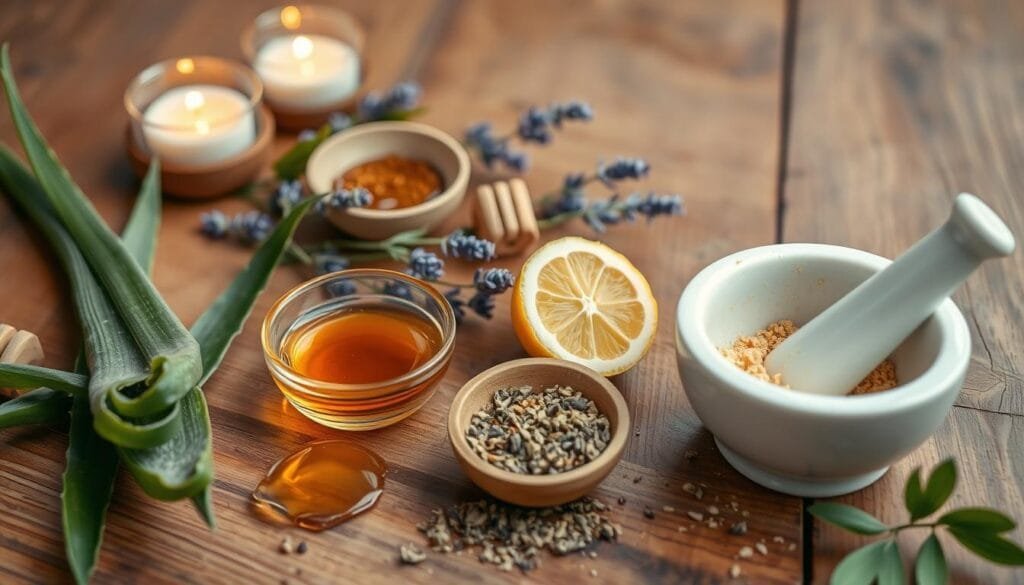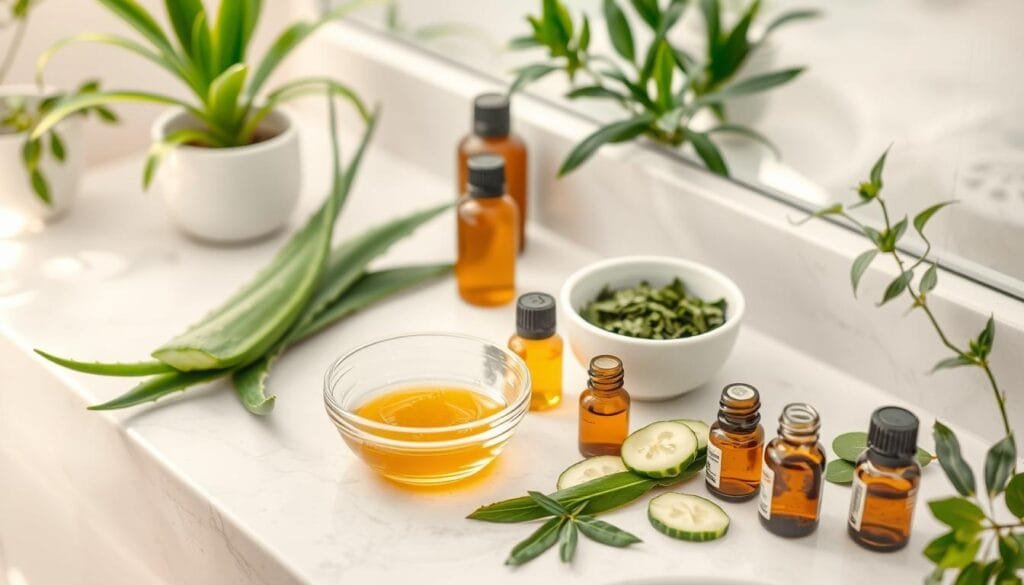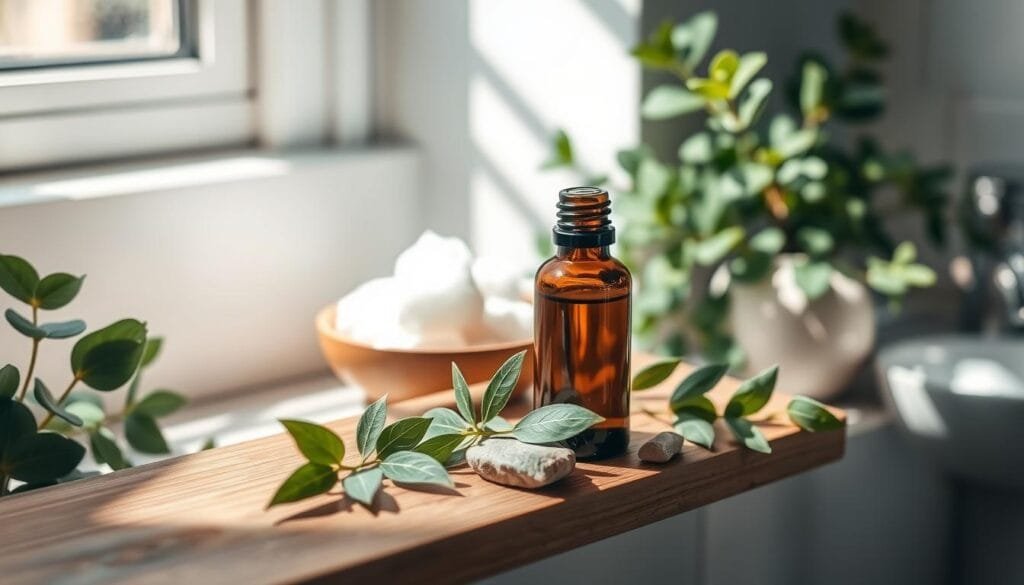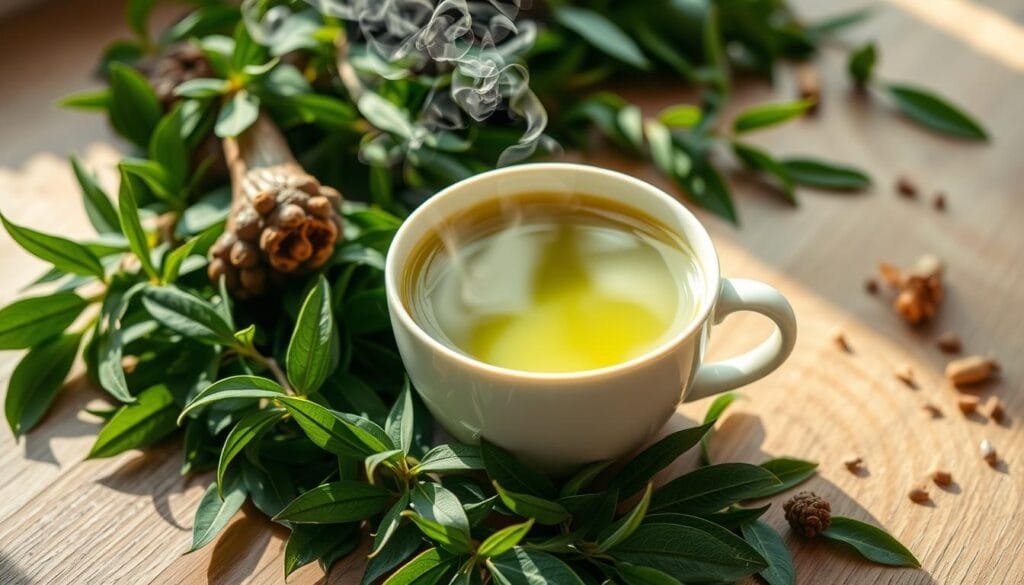Dealing with acne can be really tough. But, you don’t need to use harsh drugs to get clear skin. Nature has many strong remedies for acne that are gentle on your skin. I’ve fought acne myself and found natural ingredients that really work. I’m excited to share these natural solutions with you.
Key Takeaways
- Acne affects up to 95% of people during adolescence due to hormonal changes.
- Natural remedies like tea tree oil, green tea, and zinc supplements can effectively treat acne.
- Incorporating a skincare routine with these natural ingredients can help you achieve clearer, healthier skin.
- Dietary changes and probiotic supplements may also play a role in managing hormonal acne.
- Patch testing is critical before using any new natural remedy to avoid irritation.
Understanding Hormonal Acne
Hormonal acne is a common skin issue that many face, often during puberty or adulthood. Changes in hormones can lead to more oil and clogged pores. Knowing what causes and types of hormonal acne can help manage it better.
What Causes Hormonal Acne?
Hormonal acne is mainly caused by hormonal changes or imbalances. Androgens, the hormones involved in reproduction, play a big role. They make the skin’s oil glands work harder, causing pores to clog and acne to form.
In females, hormonal acne is linked to higher androgen levels or lower estrogen levels. Stress, lack of sleep, and certain foods like high-glycemic or dairy products can also affect hormone levels and lead to acne.
Types of Hormonal Acne
Hormonal acne can show up in different ways, including:
- Whiteheads: Closed, flesh-colored bumps
- Blackheads: Open, dark-colored pores
- Papules: Small, red, and inflamed lesions
- Pustules: Pus-filled, inflamed lesions
- Nodules: Painful, solid lumps under the skin
Hormonal acne often appears in the T-zone, which includes the forehead, nose, and chin. It can also follow a cycle, often around a person’s menstrual cycle.
Knowing the specific type and pattern of hormonal acne helps find the best treatment. Getting advice from a dermatologist can be very helpful in managing this condition.
Traditional Acne Treatments
If you’re dealing with hormonal acne, there are many traditional treatments to try. You can look into topical retinoids, oral contraceptives, and anti-androgen drugs.
Topical Retinoids
Topical retinoids like tretinoin, tazarotene, and adapalene can help with mild to moderate hormonal acne. They clear pores, reduce swelling, and help skin cells renew for a clearer look.
Oral Contraceptives
Some oral contraceptives, like those with ethinyl estradiol and drospirenone, can manage hormonal acne. They balance the hormones that cause breakouts.
Anti-Androgen Drugs
Anti-androgen drugs, like spironolactone, lower male hormones in the body. This can be a big help for severe or lasting acne.
Talking to a dermatologist is key to finding the best treatment for your skin. They can help you choose the right option for clearer, healthier skin.
Natural Remedies for Acne
Conducting a Skin Patch Test
When looking into natural remedies for acne, it’s important to be careful. Always do a skin patch test before using new products on your face. Some natural ingredients might be good but can also irritate or cause allergic reactions in some people. Doing a patch test helps avoid these issues and keeps your skin healthy and clear.
To do a skin patch test, put a small amount of the natural remedy on your wrist or behind your ear. Watch the area for 24 hours for any redness, itching, or swelling. If it looks and feels fine, you can use it on your face. But if it gets irritated, pick a different natural remedy that’s better for your skin.
Even though natural ingredients are often safe, they can affect people differently. So, it’s smart to be careful when adding new things to your skincare routine. By doing a skin patch test, you can be sure you’re making the right choice for your acne.
Tea Tree Oil for Acne
If you’re dealing with acne, tea tree oil might be worth trying. It’s a natural ingredient that has been used for ages to tackle skin issues, including acne.
Tea tree oil is thought to have anti-inflammatory and antimicrobial properties. These can help lessen acne’s inflammation and bacteria. A 2006 study from Clinical Microbiology Reviews showed it might even treat cystic acne.
Studies by the National Library of Medicine found that using tea tree oil twice a day can help with mild acne. It works best when paired with other natural treatments like aloe vera. A 2015 study from PubMed also showed it can reduce acne scarring.
Tea tree oil is often found in skincare products to fight acne. It’s usually mixed with other oils or moisturizers to be gentle yet effective. You can also use it as a spot treatment or in home remedies like clay masks or overnight masks with aloe vera and coconut oil.
“Tea tree oil is utilized not only as a spot treatment for acne but also in various acne home remedies such as clay masks, overnight masks with aloe vera and coconut oil, and in combination with black charcoal masks to remove blackheads.”
While natural remedies like tea tree oil can be helpful, they’re not scientifically proven to cure or guarantee improvement in acne. Be careful, as they might not work for everyone, and can be harsh on sensitive skin. Always do a skin patch test before trying any new product or ingredient.
Alpha Hydroxy Acids (AHAs)
If you want to fight acne and get smoother skin, alpha hydroxy acids (AHAs) might be what you need. AHAs come from plants and can exfoliate your skin. They also help reduce acne scars.
There are seven types of AHAs, like citric acid and glycolic acid. Glycolic and lactic acids are the most studied and safe for most skin types.
AHAs work by removing dead skin cells and making new ones. This makes your skin look brighter and feel smoother. They also help with collagen and can make your skin less dull by improving blood flow.
| AHA Type | Key Benefits |
|---|---|
| Glycolic Acid | Brightens skin, corrects discoloration |
| Lactic Acid | Improves skin texture, reduces wrinkles |
| Citric Acid | Enhances skin brightness |
Even though AHAs are great for acne and skin health, use them carefully. They make your skin more sensitive to the sun. Always use sunscreen with AHA products. Start with a small amount and test it on a small area first. Some people might feel burning or dryness at first.
With the right use, AHAs can help you get clear, glowing skin. But, talk to a dermatologist first if you have any skin issues before adding AHAs to your skincare routine.
Green Tea for Clearer Skin
If you’re dealing with acne, green tea might help. It has compounds called catechins, like EGCG, which can benefit your skin.
EGCG in green tea fights inflammation, reduces redness, and controls oil. Drinking green tea or using it on your skin may make acne look better.
Green tea also lowers lipid levels and stops too much sebum. This can help with hormonal acne. People use green tea at home for acne, but more research is needed.
To use green tea for acne, make a mask with the leaves and honey or aloe vera. Apply it to your skin for 10-20 minutes, 2-3 times a week. Drinking 2-3 cups a day may also help, but the best amount is being studied.
Choose high-quality green tea from China or Japan for more benefits. Look for brands like Yogi, Numi, Twinings, Bigelow, and Harney & Sons.
But, too much green tea extract can harm your liver. Use it in moderation for better skin.
Green tea’s antioxidants and anti-inflammatory effects make it a good choice for acne. Adding green tea to your skincare or diet may improve your skin’s look.
Diet and Hormonal Acne
If you’re dealing with hormonal acne, your diet might be a big factor. The exact connection between diet and acne isn’t clear. But studies hint that some foods, like those high in sugar and dairy, could affect hormones. This might lead to more breakouts.
Foods to Avoid
To fight hormonal acne, try cutting down on these foods:
- Sugary foods and refined carbs, like white bread and pastries, can raise insulin levels and make acne worse.
- Dairy products, including milk and cheese, contain hormones that might trigger acne.
- Whey protein has been linked to acne in some people.
- High-glycemic foods, such as white potatoes and processed snacks, can also increase hormones that cause acne.
Foods that May Help
But, some foods are good for your skin:
- Omega-3 fatty acids in fatty fish, like salmon, can lower inflammation and might help with acne.
- Antioxidant-rich foods, like berries and leafy greens, fight free radicals that cause acne.
- Probiotic-rich foods, like yogurt and fermented veggies, support gut health and might improve acne.
natural remedies for acne
Are you tired of using harsh chemicals for acne? Natural remedies can be a better choice. Tea tree oil, alpha-hydroxy acids (AHAs), and green tea are just the start. Many other natural ingredients can also help with hormonal acne.
Aloe vera gel is great for its soothing and anti-inflammatory effects. Apple cider vinegar and honey can reduce bacteria and inflammation. Turmeric has anti-inflammatory compounds that are good for acne-prone skin.
- Aloe vera gel cools the skin and reduces redness and swelling from acne.
- Apple cider vinegar balances the skin’s pH and kills bacteria that cause acne.
- Honey has antibacterial and anti-inflammatory properties that help acne-prone skin.
- Turmeric contains curcumin, which fights inflammation and discoloration from breakouts.
Always do a patch test before using these remedies to make sure your skin reacts well. While natural remedies are helpful, severe acne might need a dermatologist’s care. But for mild hormonal breakouts, these natural options are worth trying!
“Using natural ingredients like aloe vera, apple cider vinegar, honey, and turmeric can be a gentle and effective way to address mild hormonal acne.”
Establishing a Skincare Routine
Keeping your skincare routine consistent is key to fighting hormonal acne. By adding a few simple steps to your daily care, you can clean, treat, and protect your skin. This helps prevent breakouts.
Begin your day with a gentle face wash that preserves your skin’s natural oils. Choose formulas that won’t clog pores. Then, apply a lightweight, oil-free moisturizer with sunscreen. This protects your skin from UV rays, which can worsen acne.
At night, wash your face again to remove makeup, dirt, and extra oil. Use a targeted acne treatment with salicylic acid or benzoyl peroxide to clear pores and dry out spots. Finish with a non-comedogenic moisturizer made for acne-prone skin.
Adding a weekly exfoliating mask or clay mask can improve your skin’s look. It removes dead skin and absorbs oil. Always test new products on a small area first to avoid irritation.
By sticking to a morning and evening skincare routine for acne, you can keep your skin clear and healthy. The right mix of cleansing, moisturizing, and treatments will give you the glowing, clear skin you desire.
Probiotics for Acne
If you’re dealing with acne, probiotics might help. They are good bacteria that can fight acne by reducing swelling and balancing your immune system. Also, a healthy gut from probiotics can make your skin better.
How Probiotics May Help
Board-certified dermatologist Blair Murphy-Rose says probiotics can help with acne. They support the skin’s good bacteria and lower inflammation. A study in the International Journal of Women’s Dermatology shows probiotics on the skin can reduce acne-causing bacteria.
Probiotics also balance gut bacteria, which can help reduce skin inflammation. This is key because people with acne often have an imbalance in their gut bacteria. Dermatologist Joshua Zeichner agrees.
Probiotics have many benefits, like calming inflammation and protecting the skin. But, they might not work for everyone, as genetics can also affect acne. Always talk to a doctor before taking probiotics, if you’re pregnant or breastfeeding.
Skincare products with probiotics are getting popular. Brands like Tula Skincare offer them for those with acne-prone skin.
Probiotics are a good tool against acne, but they might not stop all breakouts. Genetics can play a big role. Always keep up with a good skincare routine and see a dermatologist for your skin issues.
Clay Masks for Acne
If you have acne-prone skin, clay masks can help. They draw out impurities and excess oil, unclogging pores and reducing breakouts. Using a clay mask a few times a week can change your skincare game.
The Vivant Skin Care Sulfur Face Mask is a top choice. It has a 4.75 out of 5 rating from 545 reviews. Eighty percent of these are 5-star, praising its cleansing and moisturizing effects.
This mask has 10% sulfur and Bentonite clay. It’s designed to fight acne and detoxify the skin. Users suggest applying it up to three times a week, starting with one application and increasing as needed.
A clinical study involved 75 adults with oily or combination skin. Over 70% were women. After four weeks, they saw big improvements in acne, sebum, and hydration. Every participant had positive results.
The Vivant Skin Care Sulfur Face Mask costs $68 for a 6oz jar. It’s a natural solution for acne. With a 60-day return policy and worldwide shipping, it’s easy to try it out.
“This clay mask is a game-changer for my acne-prone skin. It leaves my face feeling deeply cleansed and refreshed, without any dryness or irritation. Highly recommend!”
Always do a patch test before using a clay mask. Start with once a week and increase as needed. The right clay mask can give you clearer, healthier-looking skin and help you say goodbye to acne.
Zinc Supplements and Acne
If you’re dealing with tough acne, zinc supplements might help. Zinc is key for skin health and can make acne look better, research shows.
Zinc fights inflammation, which reduces acne redness and swelling. It also controls oil and cell growth, helping prevent acne. Studies suggest zinc supplements can help with acne, but more research is needed.
The best dose for acne is 80 to 140 mg of zinc. This is more than the daily amount adults need. Start with a small dose and increase it slowly.
Zinc supplements, like zinc sulfate, are best for acne. Taking zinc with antibiotics like erythromycin can speed up treatment and improve results.
Eating zinc-rich foods like oysters, red meat, poultry, and legumes is also good. These foods can help your skin and health.
Before trying zinc supplements, talk to a doctor. They can help you find the right dose and make sure it’s safe for you. Zinc could be a great tool in fighting acne.
“Zinc is a versatile mineral that plays a critical role in skin health, making it a promising natural remedy for acne.”
Conclusion
Hormonal acne can be tough and upsetting. But, there’s hope with natural remedies. Tea tree oil and alpha hydroxy acids (AHAs) have anti-inflammatory and antibacterial effects. Green tea and probiotics can also help clear your skin.
Remember, everyone’s skin is different. What works for one person might not work for another. If your acne doesn’t get better or gets worse, see a dermatologist. They can give you advice and treatments that fit your needs.
Using natural remedies and living a healthy lifestyle can help you fight acne. Eat well, manage stress, and stick to a skincare routine. With time and the right steps, you can get the clear, glowing skin you want. This will boost your confidence and let you feel free.
FAQ
What causes hormonal acne?
What are the different types of hormonal acne?
What are the traditional treatments for hormonal acne?
How do I conduct a skin patch test for natural remedies?
How can tea tree oil help with acne?
What are the benefits of using alpha hydroxy acids (AHAs) for acne?
How can green tea help with acne?
What dietary changes can help with hormonal acne?
What other natural remedies can help with hormonal acne?
How can probiotics help with acne?
How can clay masks benefit acne-prone skin?
How can zinc supplements help with acne?
Source Links
- Fight Acne with These Simple At-Home Remedies – https://www.healthline.com/nutrition/13-acne-remedies
- 16 Effective and Safe Home Remedies for Acne – https://www.medicalnewstoday.com/articles/322455
- Treatments and Natural Remedies for Hormonal Acne – https://www.healthline.com/health/beauty-skin-care/hormonal-acne
- How to treat hormonal acne naturally at home – https://www.medicalnewstoday.com/articles/how-to-treat-hormonal-acne-naturally-at-home
- Home Remedies for Acne: Do They Work? – https://health.clevelandclinic.org/home-remedies-for-acne
- Medicinal Plants for the Treatment of Acne Vulgaris: A Review of Recent Evidences – https://www.ncbi.nlm.nih.gov/pmc/articles/PMC4740760/
- 7 Soothing Home Remedies for Acne – https://www.everydayhealth.com/skin-and-beauty/home-remedies-for-acne.aspx
- Natural And Alternative Ways Of Treating Acne – Dr Davin Lim – https://drdavinlim.com/natural-and-alternative-ways-of-treating-acne/
- A guide to tea tree oil and using it for acne spots – Stratum Clinics – https://www.stratumclinics.com/a-guide-to-tea-tree-oil-and-using-it-for-acne-spots/
- Tea Tree Oil: Properties and the Therapeutic Approach to Acne—A Review – https://www.ncbi.nlm.nih.gov/pmc/articles/PMC10295805/
- Alpha Hydroxy Acid: 8 Skincare Benefits and How to Use it – https://www.healthline.com/health/beauty-skin-care/alpha-hydroxy-acid
- Alpha hydroxy acid (AHA): Types, benefits, and how to use – https://www.medicalnewstoday.com/articles/alpha-hydroxy-acid
- 8 Best Ingredients for Acne-Prone Skin – https://www.webmd.com/skin-problems-and-treatments/acne/features/best-ingredients-for-acne-prone-skin
- All About Green Tea for Acne: Why It Works, How to Use It & More – https://www.healthline.com/health/beauty-skin-care/green-tea-for-acne
- Green tea for acne: Uses, benefits, and forms – https://www.medicalnewstoday.com/articles/green-tea-for-acne
- Hormonal Acne Diet: What to Eat to Improve Your Acne – https://www.healthline.com/nutrition/hormonal-acne-diet
- Hormonal acne diet: Foods to eat and avoid to treat acne naturally – https://www.medicalnewstoday.com/articles/hormonal-acne-diet
- 8 Natural Remedies for Acne to Add to Your Routine, According to Experts – https://www.byrdie.com/natural-remedies-for-acne
- Everything You Need to Know to Start a Natural Skin Care Routine – https://www.healthline.com/health/beauty-skin-care/natural-skin-care-routine
- Clear Skin: Why You Need a Skincare Routine for Acne – https://www.cerave.com/skin-smarts/skin-concerns/acne/why-an-acne-routine-is-essential-for-clear-skin
- Here’s Everything You Need to Know About Taking Probiotics for Acne – https://www.byrdie.com/probiotics-for-acne
- Probiotics for Acne & Skin Health | Probiotics Learning Lab – https://www.optibacprobiotics.com/learning-lab/in-depth/general-health/can-probiotics-improve-skin-health
- The effect of probiotics on immune regulation, acne, and photoaging – https://www.ncbi.nlm.nih.gov/pmc/articles/PMC5418745/
- Acne Relief Calming & Soothing Clay Mask | PerriconeMD – https://www.perriconemd.com/p/acne-relief-calming-and-soothing-clay-mask/13110180/?srsltid=AfmBOorM700xv0bOTFZ997B0W2YmrINQqjJOIiyfhiAwXSurY_r-SVfy
- Vivant Skin Care | Sulfur Face Mask For Oily And Acne-Prone Skin – https://www.vivantskincare.com/products/sulfur-clay-mask?srsltid=AfmBOooIidjk-VbH5wALZ6osfybJNKiKoJSdJ5eRiO7Kia7cwF35uAhw
- Comprehensive assessment of the efficacy and safety of a clay mask in oily and acne skin – https://www.ncbi.nlm.nih.gov/pmc/articles/PMC10626287/
- ZINC & SKIN CARE: Decrease Acne By Reducing Oil Production – Dr Davin Lim – https://drdavinlim.com/a-z-skin-care/zinc-skin-care/
- Eternal Dermatology & Aesthetic Center – https://www.eternaldermatology.com/zinc-and-acne-does-it-help-or-hurt/
- Seeking new acne treatment from natural products, devices and synthetic drug discovery – https://www.ncbi.nlm.nih.gov/pmc/articles/PMC5821150/
- Top 10 Natural Remedies for Acne: Do they really work? – https://eleven11spa.com/natural-remedies-for-acne/
- 11 Holistic Acne Treatments – https://vibrantskinbar.com/blog/holistic-acne-treatment/









